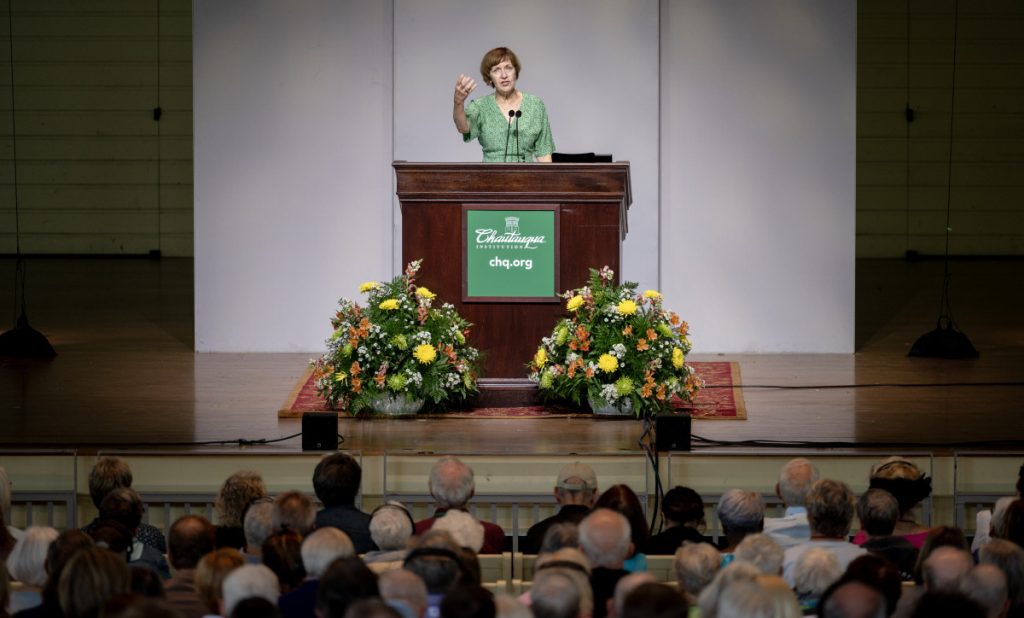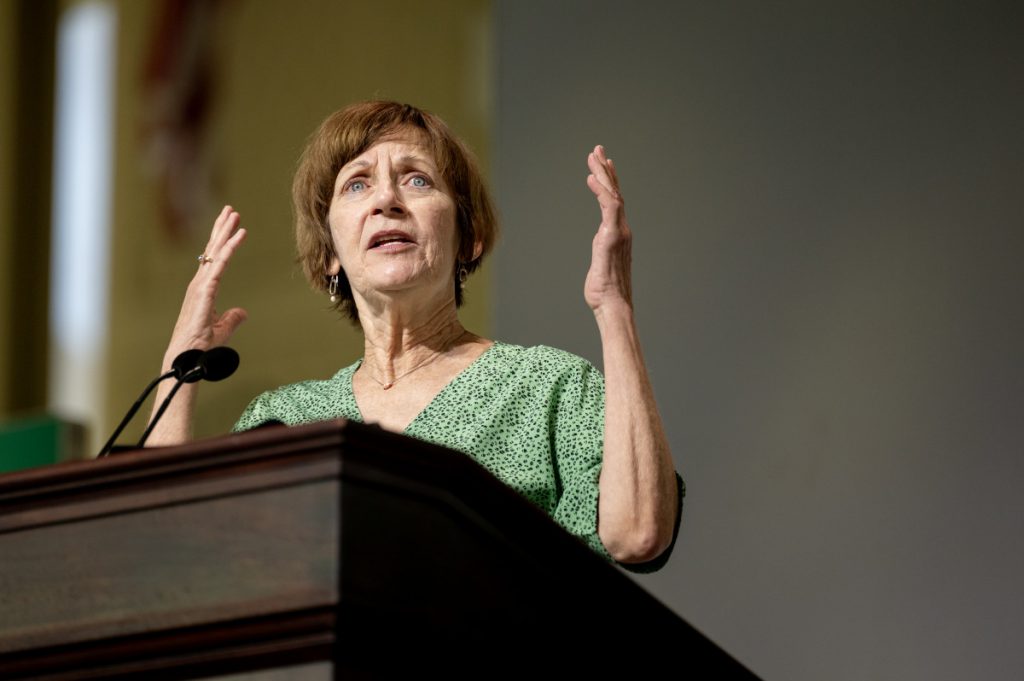
Alton Northup
Staff writer
Maureen Corrigan cannot predict the future of literature, but she can talk about right now.
An author, Georgetown professor and the longtime book critic on NPR’s Peabody Award-winning “Fresh Air,” Corrigan said she has noticed several trends – including rising censorship – changing American literature. She discussed these issues in her lecture, “Reading in the Dark,” at 10:45 a.m. Monday in the Amphitheater to open the Chautauqua Lecture Series Week Six theme, “A Life of Literature.”
The social novel has made a dominant return to bookshelves, Corrigan said. The genre, which dates to 19th-century England, is of fiction that explores a prevailing social problem. As American writers focus on race, gender, climate, immigration, AI and relations of power, she calls this new wave the “condition of America novel.”
The 2023 shared Pulitzer Prize for Fiction demonstrates how popular the social novel has become, she said. Demon Copperfield, by Barbara Kingsolver, is a recasting of David Copperfield set in Appalachia. The protagonist, Damon Fields, lives in a trailer home and details his encounters with poverty, addiction and other contemporary issues in the South, according to the Pulitzer website. Trust, by Hernan Diaz, is set in a bygone America and examines wealth and power in a capitalistic society.
“It’s understandable that we’re seeing a lot of socially aware novels,” Corrigan said. “We live in a world that’s very anxious about a lot of issues, and literature is one of the ways in which we grasp – and even imagine solutions to – those larger dilemmas of our time.”
She used the word “resurgence” because American literature has seen this trend before.
Politically engaged authors, such as John Steinbeck and Richard Wright, defined the 1930s with their bleak landscapes and ordinary characters suffering problems at the hands of exploitative systems. The era also ushered in hard-boiled fiction, with its tough, unsentimental look at a world gone wrong.
Modern issues of climate change, authoritarianism in Europe and economic turmoil reflect the Dust Bowl, the Great Depression and rise of fascism in Europe that authors of that time wrote about, Corrigan said.
“We’re living in a moment where imaginative literature is foregrounding the social problems of our time,” she said.
To meet this moment, two lawmakers have proposed reviving the Federal Writers Project. U.S. Rep. Ted Lieu (D-CA) and U.S. Rep. Teresa Leger Fernandez (D-NM) introduced the 21st Century Federal Writers’ Project Act in May 2021, which would assist 900 unemployed or under-employed writers to document American society — particularly the impacts of COVID-19 in the country. The original program, established in 1935 by President Franklin Delano Roosevelt’s Works Progress Administration, provided jobs to 10,000 writers, editors and researchers during the Depression. Their work resulted in book-length explorations of all 48 states at the time and recorded history from across the country.
But not everyone is throwing their support behind writers. According to the American Library Association, 2022 saw the highest number of book challenges since the organization started tracking the statistics more than 20 years ago.
“As more people are feeling empowered to write about social issues in America, there’s an accompanying pushback – a very strong pushback – to silence those voices,” Corrigan said. “I sometimes think Americans show more passion about banning books than they do for reading them.”
Recently, she created a streaming series for Wondrium titled “Banned Books, Burned Books: Forbidden Literary Works.” In it, she examines the history of books challenges from the Inquisition to critical race theory.
One of the books she presents in the series is New English Canaan by Thomas Morton. A humorous dissent against Puritan society – which he was banished from three times – the book celebrates Native peoples and proposed a vision of co-existence. Published in 1633, it became the first book banned in what would become the United States, just four years later.

By 1800, only two copies of New English Canaan existed in the United States.
“Books can be silenced; they can be disappeared,” Corrigan said. “Our inheritance is very fragile.”
While most book challenges come from the political right, she said, the left is also guilty of book bans. In these cases, they are often brought on by the actions of an author, such as backlash to J.K. Rowling after the Harry Potter author’s transphobic remarks.
Reading pushes back against ignorance and isolation, Corrigan said. Attacks on books “affirm the power of books” to disrupt and change minds.
Corrigan closed her lecture by remembering the Aug. 12, 2022, stabbing of author Salman Rushdie — the subject of a fatwa issued by Iran’s Grand Ayatollah Ruhollah Khomeini, who called for his death after the publication of his book, The Satanic Verses.
In a recent speech at the 2023 PEN America Literary Gala, Rushdie criticized attacks in the West on libraries, book bans and plans to revise previously published material by Ian Fleming and Ronald Dahl.
“ ‘The freedom to publish is also the freedom to read, to be able to read what you want and not have it chosen for you,’ ” Corrigan said, quoting Rushdie. “ ‘Books have to come to us from their time and to be of their time – and if that’s too difficult to take, don’t read those books.’ ”




